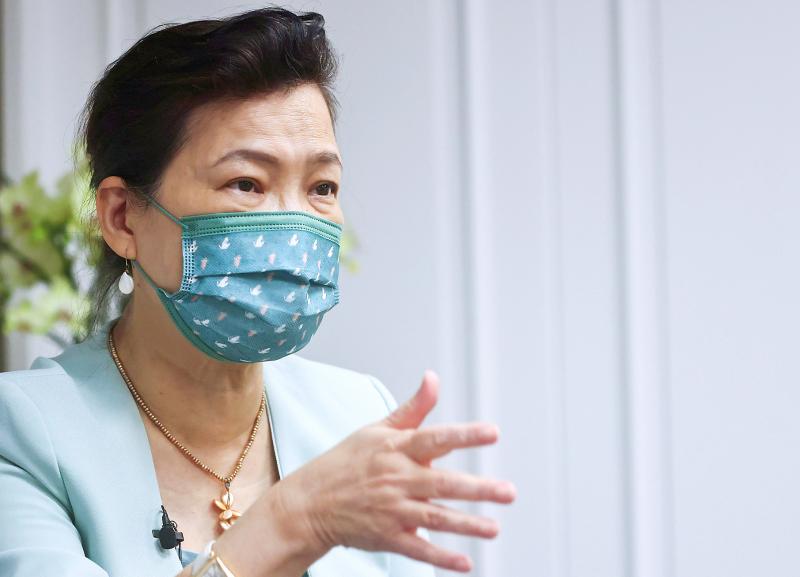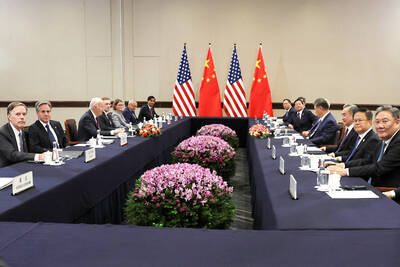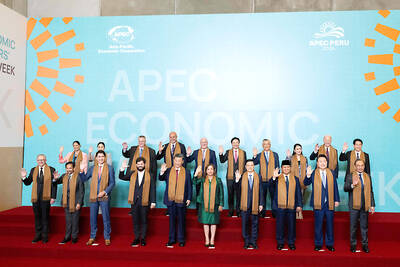Peace in the Taiwan Strait is key to Taiwan’s ability to ensure a continuous supply of the chips needed to power a wide range of products from vehicles to smartphones, Minister of Economic Affairs Wang Mei-hua (王美花) said.
Taipei is seeking to rally political support as China ramps up its aggression toward Taiwan. Chinese warplanes made a record 93 flights close to Taiwan over a three-day period starting on Friday, prompting the US Department of State to express concern and urge China to cease its “provocative” actions.
“Taiwan has helped foster a great chip manufacturing ecosystem with three decades of efforts against the backdrop of globalization,” Wang said in an interview on Friday last week. “The global community should take Taiwan’s security more seriously so Taiwan can continue to provide stable service to everyone and be a very good partner to everyone.”

Photo: Ann Wang, Reuters
Wang’s comments highlight the increasingly politicized nature of semiconductors as governments around the world scramble to secure sufficient chips from Taiwan to accelerate an economic rebound post-COVID-19.
Taiwan Semiconductor Manufacturing Co (TSMC, 台積電) boasts a 53 percent share of the contract chipmaking market, fueling concern that any instability in the Taiwan Strait could cut off supply of chips used by hundreds of companies. TSMC chairman Mark Liu (劉德音) in July also called for peace in the region to prevent disruptions to the supply chain.
The heavy reliance on TSMC and its local peers has spurred governments in the US, the EU, Japan and China to mull bolstering their own domestic chip industries. US President Joe Biden’s administration last month stepped up pressure on companies to disclose details of their supply-and-demand structures, as the global chip shortage continued to wreak havoc on many industries, including automaking.
Intel Corp CEO Pat Gelsinger said that the US government should prioritize support to domestic US chipmakers, characterizing foreign supply chains as “insecure.”
Wang dismissed concerns that companies around the world are too dependent on Taiwan, saying that the country focuses mostly on chip fabrication within the complex global semiconductor supply chain.
It still needs equipment and materials from other countries, such as gear from US-based Applied Materials Inc and the Netherlands’ ASML Holding NV, which has a monopoly on extreme ultraviolet (EUV) lithography systems required for manufacturing the most cutting-edge chips, she said.
“We can buy EUV machines only from ASML. Are we going to say that it is too risky for us to be so dependent on ASML?” Wang said. “Taiwan has built a professional and reliable ecosystem over a long period of time, so many chip designers end up getting Taiwan to make the chips. It is really because Taiwan has a very efficient production system. Taiwan actually grows and thrives together with global equipment and material suppliers.”
Taiwanese chipmakers are already doing their part to alleviate shortages plaguing the global automotive industry, she said, with TSMC boosting output of automotive microcontrollers by 60 percent from last year. It is also spending US$100 billion to expand manufacturing over three years.
However, chip packaging and testing services in Malaysia have been affected by lockdowns, and that is causing the current bottleneck in supply, she said.
TSMC produces a significant portion of the semiconductors needed by major auto chip suppliers such as Infineon Technologies AG, NXP Semiconductors NV and Japan’s Renesas Electronics Corp, companies that automakers around the world depend on for essential electronic components for their vehicles.
To mitigate US national security concerns, TSMC is building a US$12 billion plant in Arizona with the goal of starting production by 2024. The company is also considering building a fab in Japan and studying the feasibility of a creating a plant in Germany. It is also adding capacity in a fab in Nanjing, China.
At home, the Taiwanese government is making efforts to provide TSMC with adequate water and electricity supply in anticipation of the chipmaker’s future needs, Wang said.
TSMC has pledged to using 100 percent renewable energy and producing zero indirect carbon emissions from electricity consumption by 2025.
“The chip industry has propped up Taiwan’s economy. It is a key pillar to Taiwan’s economic security and overall security,” Wang said. “We are working hard to ensure that Taiwan will continue to be a reliable partner for everyone to collaborate with.”

ONE LAST TALK: While Xi said that Taiwan was a ‘red line,’ Biden, in what is likely his last meeting with Xi as president, called for an end to China’s military activity around Taiwan China’s military intimidation and economic coercion against Taiwan are the main causes of tensions that are destabilizing peace in the Taiwan Strait, Taipei said yesterday while thanking US President Joe Biden for expressing Washington’s firm stance of maintaining peace and stability in the region. Biden and Chinese President Xi Jinping (習近平) met on Saturday for their third meeting and their first talks in seven months on the sidelines of the APEC forum in Lima, Peru. It was likely Biden’s last meeting as president with Xi. During their conversation, Biden reiterated the US’ opposition to any unilateral change to the “status quo” from either

Taiwan would participate in the 2026 APEC summit to be hosted by China after Beijing promised it would ensure the personal safety of attendees, Taiwanese national security sources said yesterday. The APEC Leaders’ Machu Picchu Declaration announced yesterday said that China would host the APEC summit in 2026. Beijing proposed hosting the summit shortly before this year’s gathering began on Friday, a national security official said, speaking on condition of anonymity. Many APEC members expressed concerns about China hosting the event and said that prior communication over the decision was insufficient, the official said. Taiwan brought up concerns about legal “guidelines” China announced in

SUPPORT: Arms sales to NATO Plus countries such as Japan, South Korea and Israel only have to be approved by the US Congress if they exceed US$25m The US should amend a law to add Taiwan to the list of “NATO Plus” allies and streamline future arms sales, a US commission said on Tuesday in its annual report to the US Congress. The recommendation was made in the annual report by the US-China Economic and Security Review Commission (USCC), which contained chapters on US-China economic and trade ties, security relations, and Taiwan and Hong Kong. In the chapter on Taiwan, the commission urged the US Congress to “amend the Arms Export Control Act of 1976 to include Taiwan on the list of ‘NATO Plus’ recipients,” referring to

Minister of Labor Ho Pei-shan (何佩珊) said she would tender her resignation following criticism of her handling of alleged bullying by Ministry of Labor Workforce Development Agency branch director Hsieh Yi-jung (謝宜容) resulting in the death of an employee. The ministry yesterday gave Hsieh two demerits and said she is subject to review by the Disciplinary Court. The severest possible punishment would be her removal from office and being barred from government jobs indefinitely. Workforce Development Agency Director-General Tsai Meng-liang (蔡孟良) also received a major demerit and was transferred to another position. Premier Cho Jung-tai (卓榮泰) issued a formal apology